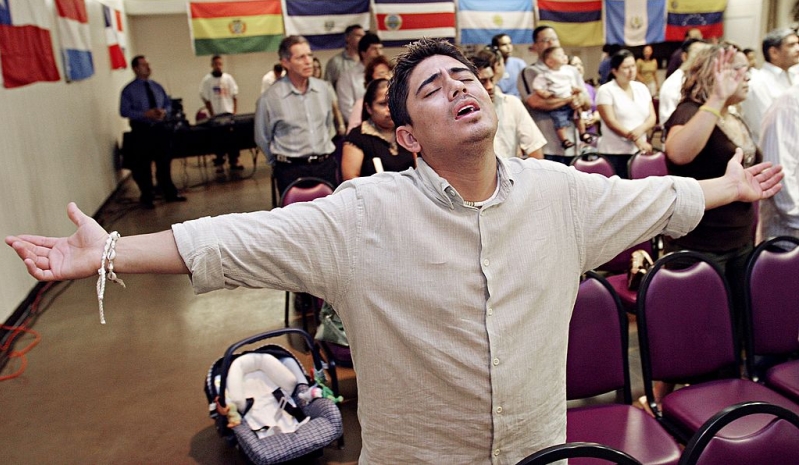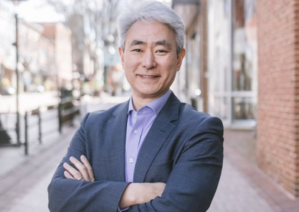
In a world increasingly shaped by polarization and partisanship, evangelicalism in America is undergoing a quiet, profound transformation—one that is largely missed by media narratives and political commentators, says Rev. Dr. Walter Kim, president of the National Association of Evangelicals (NAE). He argues that the story of American evangelicalism is far more diverse, nuanced, and hopeful than commonly portrayed.
Kim, who became the first person of color to lead the NAE in 2020, spoke with Christian Daily International in an in-depth interview about his personal journey, the shifting face of the evangelical Church, and what he sees as both the deepest challenges and promising opportunities for followers of Jesus Christ in the United States today.
‘We engage with people on both sides of the aisle’
Founded in 1942, the National Association of Evangelicals serves as a unifying voice and platform for over 40 Protestant denominations and hundreds of affiliated ministries and nonprofit organizations. These span a wide theological spectrum—from Presbyterian and Pentecostal to Wesleyan, Mennonite, and Methodist—and include Christian colleges, seminaries, campus ministries, and humanitarian agencies.
“We’re multi-denominational, representing various traditions,” Kim explained. “And there’s been significant growth in recent decades, especially in the number of evangelical nonprofit organizations that are part of the NAE—whether they focus on education, relief, or evangelism.”
The NAE’s mission is grounded in shared evangelical convictions: the authority of Scripture, salvation through Christ’s atoning work, and an active faith expressed through personal discipleship and social engagement. But it is also expansive in scope, reflecting a holistic understanding of the gospel’s relevance for all areas of life.
One arm of that mission is World Relief, the NAE’s humanitarian agency. Historically one of only ten organizations recognized by the U.S. government to resettle refugees, World Relief connects new arrivals of all backgrounds with local churches. “So that the refugee is not only resettled, but also situated in community,” said Kim. “This is done in the name of Jesus.”
Another lesser-known area of engagement is the NAE’s chaplaincy program, which certifies and endorses evangelical chaplains serving in the military, healthcare, educational institutions, and increasingly in the business world. “We see the marketplace as a growing mission field,” Kim noted.
And in the realm of public life, the NAE is active in advocacy, though it intentionally does not endorse political candidates. “You’ll never see the NAE endorse a candidate,” Kim emphasized. “But we do engage with people on both sides of the aisle, in every administration, to speak into policies that reflect our convictions about the common good.”
‘My story as a son of a refugee and immigrant is increasingly the American evangelical story’
For Kim, these commitments are not just professional—they’re personal. His life has been shaped by the very evangelical ministries he now represents.
His father was a North Korean refugee who fled south during the war, eventually resettling in South Korea. “That was a time when many evangelical organizations—like World Relief and World Vision—were in South Korea helping to rebuild the country,” Kim said. “They were part of life that benefited from evangelicals doing this holistic gospel work.”

Later, his parents immigrated to the United States, where Kim was born in New York City. He grew up in a vibrant Korean Presbyterian church before moving to a predominantly white coal-mining town in Pennsylvania. It was there that he came to saving faith through a local Baptist youth pastor, using the Four Spiritual Laws produced by Cru (then Campus Crusade for Christ)—another evangelical ministry affiliated with the NAE.
“I went on to seminary in Boston and later served at Park Street Church,” Kim said, noting that Park Street was instrumental in founding the NAE in 1942. “So in many ways, my own story is the work of the NAE before I even knew what the NAE was!”
His life journey has traversed cultures, denominations, and regions—urban and rural, immigrant and majority-white, Reformed and Baptist. “This is the evangelical story,” he said. “And the fact that I’m the son of a refugee and immigrant—I think this is increasingly the American evangelical story.”
Evangelicals are diverse, but ‘media doesn’t like nuance’
Despite evangelicalism’s width and depth and its growing diversity, public understanding of it remains limited—especially also outside the U.S. “Evangelicals in America are not a monolith,” Kim said. “It’s probably better to speak of evangelicalism in the plural—evangelicalisms in America.”
Kim highlighted the significant internal diversity within the evangelical community, shaped by geography, denomination, ethnicity, and history. “You’ll find people who share core theological convictions and maybe even sing the same worship songs—but who live out their faith in very different ways,” he said.
This diversity, however, is often flattened in media portrayals, which tend to focus on the loudest and most polarizing voices, which only make up maybe 5%.
“The wings are often the loudest,” Kim said, comparing it to a bell curve. “They have the megaphones of social media and of mainstream media. But the bulk of evangelicals actually have much more nuanced views.”
That nuance is hard to capture in today’s media climate. “We don’t live in a time where nuance is appreciated,” Kim added. “Media doesn’t like nuance. It doesn’t trend well on social media. Politicians don’t work well across the aisle. And we don’t have patience for people with different ideological backgrounds.”
This lack of nuance is particularly evident in how political and social positions are reported. On immigration, for example, Kim pointed to a co-sponsored study by the NAE and Lifeway Research showing that 90% of evangelicals believe in strong borders—yet 90% also believe families should not be separated. Nearly 80% also support a path to citizenship for long-term undocumented immigrants who contribute to society, maybe just requiring them to pay a fine for not having chosen the legal way initially.
“You won’t hear that in the media,” he said. “But that’s the kind of thoughtful, biblically-informed approach many evangelicals actually hold.”
The face of evangelicalism is changing; Majority-minority is becoming the norm
Perhaps the most significant shift underway in American evangelicalism is demographic. While the media often focuses on “white evangelicals,” Kim emphasizes that the evangelical Church is increasingly multiracial and multicultural.
“In the last decade or so, we’ve been undergoing one of the most transformational inflection points in American religious history,” Kim said. “Many denominations are either approaching or have already become majority-minority,” meaning no single ethnicity represents 50% or more of the congregants.
This transformation is being driven in large part by the growth of immigrant churches. “I myself am a product of this,” Kim said. “And many denominational leaders tell me their fastest-growing congregations are immigrant-led.”
Boston, where Kim previously pastored, is a case in point. Widely considered one of America’s most secular cities, Boston has seen the number of churches double from 300 to 600 between 1965 and 2014—not due to population growth, but because of immigrant congregations.
“There were Haitian churches, East African churches, Portuguese-speaking evangelical churches,” Kim said. “That’s a quiet revival.”
These developments, Kim believes, are reshaping the face of evangelicalism. “It’s increasingly a reflection of Revelation 7:9—people from every tribe, tongue, and nation gathered together.”
But even the often-cited “white evangelicals” are different from what many people may think, Kim says. “It’s important to acknowledge that white evangelicals are more diverse than presented in the media.”
“It would be easy to over-caricaturize it according to the latest polling. But the polling can't get the nuance,” he says, highlighting the importance of the way questions are framed, which then feed certain narratives.
“Even among those who might vote a certain way, let’s say white evangelicals who voted for President Trump who might be perceived as holding very specific and narrow views on immigration, they actually had these very diverse views,” Kim says.
He points to the findings of the Lifeway study that paint a much more accurate picture than many polls referenced in mainstream media.
“Yes, we need to strengthen borders, but we also need to keep families together. Yes, we should deport criminals, but we also should give pathways for people who have contributed to their communities. That's a complicated story, and it's one that's harder to tell, but I would say it's one that's truer to tell.”
The discipleship gap: ‘We don’t have a rich theology for public life’
While there are developments that are encouraging, such as the growth of immigrant congregations and the increasing diversity of the Church, Kim is concerned about a deeper issue that lies beneath the surface: a discipleship gap.
“American evangelicalism is incredibly entrepreneurial, pragmatic, populist—in the sense that it is a grassroots movement, and personal,” he said. “These are great strengths—they’ve helped the movement grow. But they also have a flip side.”
That downside, Kim warns, is a shallow theological formation, particularly when it comes to the public expression of faith.
“We know how to lead someone to saving faith, how to disciple someone into personal morality and ensure they have a healthy marriage, we’re really good at the altar call for individual salvation,” he said. “But we don’t have a rich theology for public life—for work, for government, for civic engagement.”
Too often, he said, evangelicals let political commentators and influencers define their perspective on cultural issues. “We’ve outsourced our discipleship to cable news and social media. They have far more influence forming us as public Christians than the Bible or the Church.”
Kim called for a renewal of deliberate, theological discipleship—one that equips believers not only for personal ethics but for public engagement. “We need to cultivate a theology of culture, a theology of institutions, a theology of government—not just whether we’re being ethical, but what ethics even means in these spaces.”
‘Beautiful’ compassion and innovation gives hope
Despite these concerns, Kim sees signs of hope—rooted in the same grassroots spirit that has come to define evangelicalism in the U.S.
“I actually think the entrepreneurial side of evangelicalism holds the solution as well,” he said. Across the country, Christians are launching medical clinics, caring for single mothers, welcoming refugees, and advocating for the disabled—not just as political stances, but as gospel expressions.
“There is a spirit of compassion and innovation in the evangelical Church,” Kim said. “And that’s beautiful.”
He believes that if the Church can recover its theological depth and resist the temptation to mirror the culture’s divisions, it can offer something uniquely transformative.
‘If I could ask for one thing, it would be prayer’
Asked what he would say to evangelicals in other parts of the world, Kim responded: “If I could ask for one thing, it would be prayer that we would be evangelicals the way Jesus was an evangelical.”
He referenced Luke 4, where Jesus proclaims good news to the poor, the captive, the blind, and the oppressed. “He was the first to proclaim the evangel—the good news,” Kim said.
“It is a holistic gospel: for the transformation of the whole society—personal and public. I would invite the Church throughout the world to pray that we in America would follow in the footsteps of the One who was, in fact, the Good News.”





